Our crowdfunding campaign has ended but you can still support the Craniofacial Clinic by clicking here.
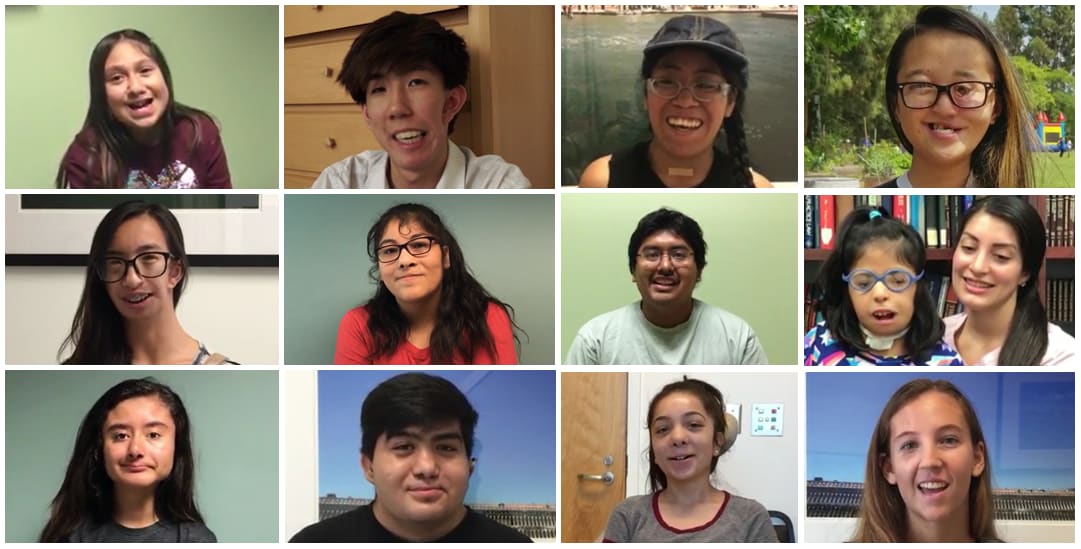
Somewhere in the US, a child is born with a craniofacial condition every hour. Craniofacial disorder results from abnormal growth patterns of soft tissue or bones of the face or skull, or trauma or cancer-related injuries. Children with craniofacial abnormalities often have difficulty breathing and swallowing food and are often afflicted with speech impediments—three of the most basic human functions necessary for life.
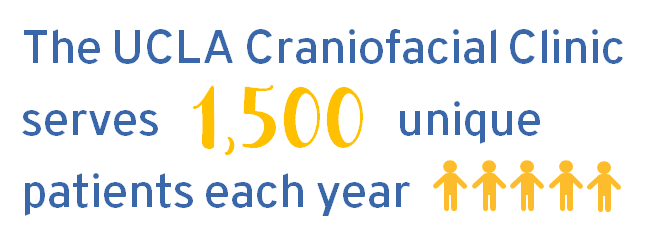
Most Americans have heard about common facial abnormalities that can be corrected with surgery, such as cleft lip and palate, but there are also severe craniofacial conditions which can be permanent and can dramatically impact the quality of life and confidence of the child, such as craniosyntosis and craniofacial microsomia.
The UCLA Craniofacial Clinic was founded in 1972 and is one of the oldest, most reputable programs in the world. The program serves as a regional center for the southwestern United States. Utilizing a team approach, we provide patients with individualized care, bringing together plastic surgeons, specialized medical experts, and social workers to develop comprehensive and coordinated treatment plans for each of our 1,500 patients.
Our medical team is all-encompassing, with craniofacial plastic and reconstructive surgeons, head and neck surgeons, pediatricians, medical geneticists, orthodontists, pediatric dentists, audiologists and speech pathologists.

Surgical services are offered at UCLA for a variety of craniofacial anomalies:
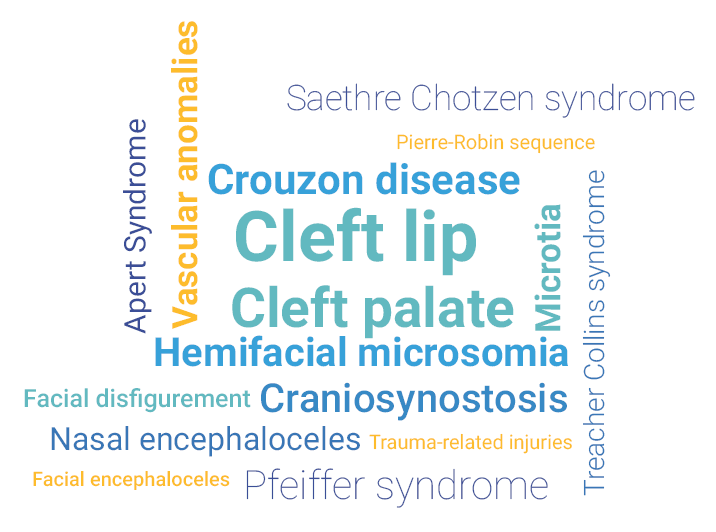
Through its multi-disciplinary approach, public programming, and supportive community of doctors and professionals, the UCLA Craniofacial Clinic empowers children and young adults with visible facial abnormalities, enabling them to cope better in society.
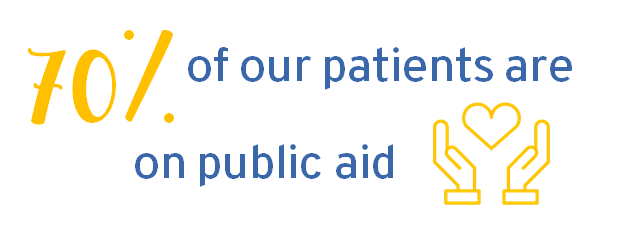
However, over 70% of our patients are under-insured and come from low-income households. Insurance companies consider certain procedures for congenital craniofacial anomalies to be cosmetic. For example, dental implants in children who are congenitally missing teeth are not covered. While this may be only 1-2 teeth in children with cleft lip and palate (several thousand dollars of out of pocket costs), certain conditions such as ectodermal dysplasia affects all of the teeth. In these cases, implants would cost patients and their families tens of thousands of dollars. As children age into adults, more of these procedures are considered cosmetic by insurance providers. Revisions of procedures to correct nasal deformities in cleft lip and palate are frequently considered cosmetic as adults.

As a UCLA Health Clinic which exists under the Division of Plastic Surgery, many of the medical treatments and surgeries we offer are considered 'cosmetic' and are not covered by insurance. Additionally, all of our supplementary therapies, like social work, speech therapy, etc. is also not covered. This leaves families with difficult choices to make.
The UCLA Craniofacial Clinic believes that every child should have access to the life-saving and life-transforming medical treatments we offer, no matter their ability to pay.
In honor of the 47 years since Drs. Henry Kawamoto and Yoshio Setoguchi founded the UCLA Craniofacial Clinic, we are seeking 47 donors who share our mission and want to support our patients by making a gift of ANY SIZE.
Philanthropic contributions enable:
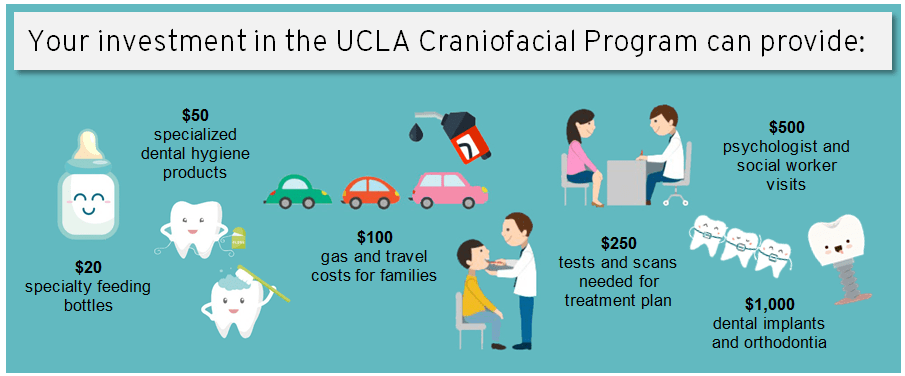
UCLA Pediatric Craniofacial Program:
Since 1972, the UCLA Pediatric Craniofacial Program has provided a multidisciplinary approach to the diagnosis and treatment of children with craniofacial differences. The program has acquired national and international recognition due to many of surgical advances in the treatment of craniofacial anomalies that our group developed. Our commonly treated diagnoses include Apert Syndrome, cleft lip and/or palate, craniosynostosis, Crouzon Syndrome, encephaloceles, craniofacial microsomia (hemifacial microsomia), microtia, Nager Syndrome, Pfeiffer Syndrome, Pierre Robin Sequence, Saethre Chotzen Syndrome, and Treacher Collins Syndrome. In popular culture, craniofacial conditions have recently gained some attention in the movie Wonder. As such, treatment of kids born with craniofacial differences require not only surgery but also multiple disciplines including dentistry, orthodontics, psychology, psychiatry, genetics, speech pathology, and audiology
Annual Craniofacial Picnic
Our picnic is an annual free event for children with congenital craniofacial conditions, their friends, and their families to come together as a community. The event is completely funded by philanthropic donations.

200,000 children are born with facial anomalies in the United States each year. $20 can provide specialty feeding bottles and nipples to babies born with cleft lip and palate.
47 to honor the 47 years since Drs. Henry Kawamoto and Yoshio Setoguchi founded the Craniofacial Clinic, and the thousands of patients served over the years, and the patients who will directly benefit from your generous support.
Gifts of $50 can help the UCLA Craniofacial Clinic afford to give products like toothpaste, toothbrushes, floss, and other specialized dental hygiene supplies to all of our patients free of charge.
A large percentage of our patients don't live in Los Angeles as craniofacial team care requires a large number of sub-specialists. Donations of $100 can be used to reimburse gas and travel costs for our low-income patient families traveling to UCLA from Bakersfield, Santa Barbara, San Luis Obispo, or Las Vegas.
Donations of $250 allow the UCLA Craniofacial Clinic to offer the tests and scans needed to determine the appropriate course of treatment free of charge for our most under-insured patients.
For our underinsured patients, mental health coverage is often limited or nonexistent. Kids with craniofacial conditions ages 8-10 are prone to anxiety and depression at higher rates than their peers. $500 can pay for 2 psychologist and social worker visits that will give these children important coping strategies and boost their mental health.
Insurance companies consider dental implants to be 'cosmetic' surgeries and do not cover this procedure. $1,000 can pay for 1 dental implant for a child who is missing teeth due to cleft lip and palate or other Craniofacial conditions.